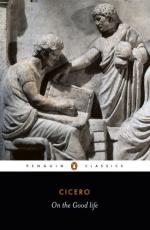
|
| Name: _________________________ | Period: ___________________ |
This test consists of 15 multiple choice questions and 5 short answer questions.
Multiple Choice Questions
1. What does Cicero address in his work, "On Duties"?
(a) Grief.
(b) Friendship.
(c) Happiness.
(d) Political life.
2. When did Cicero's reputation decline, according to the introduction?
(a) It never declined.
(b) The 18th century.
(c) The 19th century.
(d) The 17th century.
3. Who did Cicero influence, according to Grant?
(a) The children of the time.
(b) The modern philosphers.
(c) The Renaissance art.
(d) The Italian church.
4. What type of governmental system does Cicero prefer?
(a) Where the ruler is morally good.
(b) Where the ruler gives to his community.
(c) Where men elect their ruler.
(d) Where no one is taxed.
5. In "On Duties," which book is only reproduced in this particular selection of readings?
(a) Book I.
(b) Book II.
(c) Book III.
(d) Book IV.
6. What did Cicero argue is the cure for misfortune?
(a) Love.
(b) Frienship.
(c) Psychology.
(d) Philosophy.
7. What did Cicero believe the result would be if happiness was only achieved by certain goods?
(a) That happiness was permanent.
(b) That happiness was unnecessary.
(c) That happiness could only be perfected by possessing imperishable goods.
(d) That unhappiness did not exist.
8. In "On Duties," how many feelings does Cicero say a good ruler should inspire in his subjects?
(a) 2.
(b) 1.
(c) 3.
(d) 5.
9. According to the introduction, how did Pope Gregory I respond to Cicero's work?
(a) He refused to ackowledge his writings.
(b) He gave him high praise.
(c) He banned his work for centuries.
(d) He burned them.
10. Who does Grant say took over power in the Roman Republic during Cicero's writing?
(a) Cassius.
(b) Julius.
(c) Caesar.
(d) Crassus.
11. What were the followers of Aristotle called?
(a) Aristocracy's.
(b) Peripatetics.
(c) Aristotlians.
(d) Aristotle's followers.
12. What or whom does Michael Grant, the author of the introduction, introduce?
(a) Roman philosophy.
(b) Marcus Tullius Cicero.
(c) Greek philosophy.
(d) Himself.
13. In "On Duties," what will wise rulers win from their subjects?
(a) Affection.
(b) Love.
(c) Fear.
(d) Respect.
14. What does Cicero question about virtues in "Discussions at Tusculum"?
(a) Whether they can make for a supremely happy life.
(b) Whether or not they even exist.
(c) If they are a tangible or intangible component.
(d) If they are necessary to people.
15. What are the series of arguments about in "On Duties"?
(a) They are against tyranny.
(b) They are against liberty.
(c) They are against confomrity.
(d) They are against religion.
Short Answer Questions
1. What is the purpose of the book "On Duties"?
2. Who does Cicero compare Dionysius to?
3. According to Grant, what did Cicero believe every human had to make them equal?
4. Where did Cicero retire during the transition of power in the Roman republic, according to Grant's introduction?
5. According to Cicero, what will inspire hatred in a ruler's subjects?
|
This section contains 463 words (approx. 2 pages at 300 words per page) |

|




